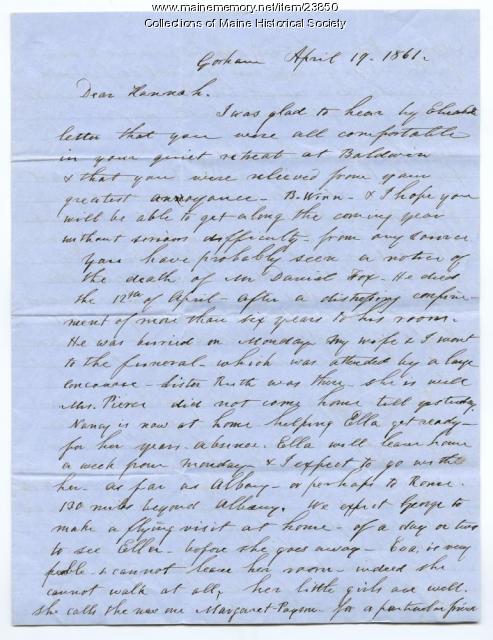Keywords: Civil rights
Item 71735
World War and Civil War Monument, Saco, ca. 1938
Contributed by: Boston Public Library Location: Saco Media: Linen texture postcard
Item 23850
Josiah Pierce on Civil War, Gorham, 1861
Contributed by: Pierce Family Collection through Maine Historical Society Date: 1861 Location: Gorham; Baldwin Media: Ink on paper
Exhibit
This Rebellion: Maine and the Civil War
For Mainers like many other people in both the North and the South, the Civil War, which lasted from 1861-1865, had a profound effect on their lives. Letters, artifacts, relics, and other items saved by participants at home and on the battlefield help illuminate the nature of the Civil War experience for Mainers.
Exhibit
While numerous Mainers worked for and against woman suffrage in the state in the late nineteenth and early twentieth centuries, some also worked on the national level, seeking a federal amendment to allow women the right to vote
Site Page
"The Civil War started people thinking about civil rights, like rights for women and people of other races."
Site Page
Maine and the Civil War - Headstone, unknown Confederate soldier, Gray, 1979
"Rights and reproductions for all UPI (United Press International) images are currently managed by Getty Images."
Story
Dancing through barriers
by Garrett Stewart
My Dad performed on the Dave Astor Show in Portland during the civil rights era.
Story
I have thought about Vietnam almost every day for 48 years
by Ted Heselton
Working as a heavy equipment operator in Vietnam
Lesson Plan
Longfellow Studies: Longfellow Amongst His Contemporaries - The Ship of State DBQ
Grade Level: 9-12
Content Area: English Language Arts, Social Studies
Preparation Required/Preliminary Discussion:
Lesson plans should be done in the context of a course of study on American literature and/or history from the Revolution to the Civil War.
The ship of state is an ancient metaphor in the western world, especially among seafaring people, but this figure of speech assumed a more widespread and literal significance in the English colonies of the New World. From the middle of the 17th century, after all, until revolution broke out in 1775, the dominant system of governance in the colonies was the Navigation Acts. The primary responsibility of colonial governors, according to both Parliament and the Crown, was the enforcement of the laws of trade, and the governors themselves appointed naval officers to ensure that the various provisions and regulations of the Navigation Acts were executed. England, in other words, governed her American colonies as if they were merchant ships.
This metaphorical conception of the colonies as a naval enterprise not only survived the Revolution but also took on a deeper relevance following the construction of the Union. The United States of America had now become the ship of state, launched on July 4th 1776 and dedicated to the radical proposition that all men are created equal and endowed with certain unalienable rights. This proposition is examined and tested in any number of ways during the decades between the Revolution and the Civil War. Novelists and poets, as well as politicians and statesmen, questioned its viability: Whither goes the ship of state? Is there a safe harbor somewhere up ahead or is the vessel doomed to ruin and wreckage? Is she well built and sturdy or is there some essential flaw in her structural frame?
Lesson Plan
Becoming Maine: The Votes for Statehood
Grade Level: 3-5
Content Area: Social Studies
Maine became a state in 1820 after separating from Massachusetts, but the call for statehood had begun long before the final vote. Why did it take so long? Was 1820 the right time? In this lesson, students will begin to place where Maine’s statehood fits into the broader narrative of 18th and 19th century American political history. They will have the opportunity to cast their own Missouri Compromise vote after learning about Maine’s long road to statehood.















